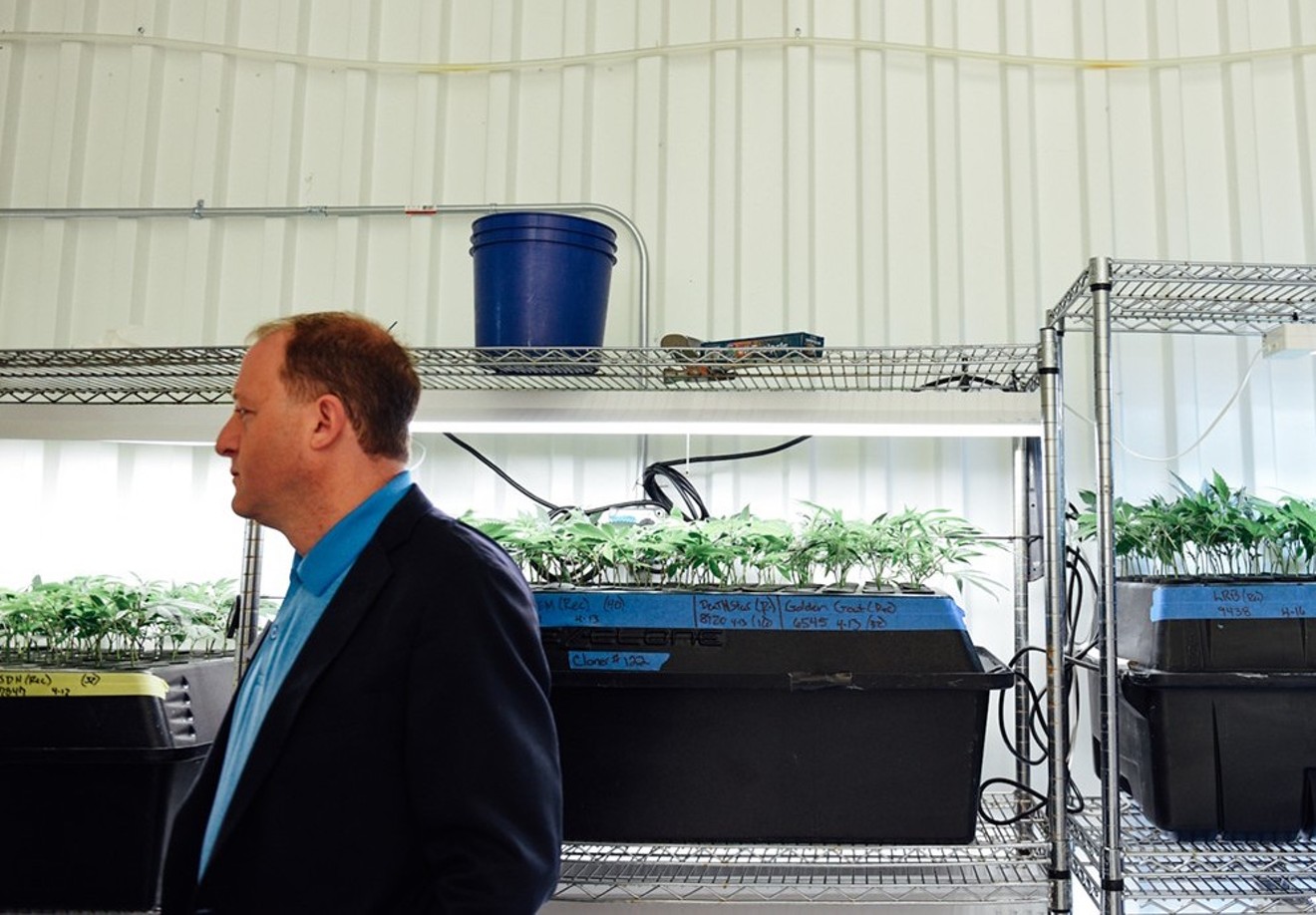Governor Jared Polis has signed an expansive bill that will add restrictions to Colorado's medical marijuana program and fund studies to research marijuana's impact on mental health.
House Bill 1317 has sparked controversy since its introduction, but that didn't stop the measure from moving quickly through the Colorado Legislature with little opposition from lawmakers. The proposal, introduced by House Speaker Alec Garnett, was billed as an attempt to curb youth use of extracted marijuana products, but medical marijuana advocates believe the new restrictions add unnecessary obstacles to patients and physicians.
Under the new law, medical marijuana physicians will be subject to requirements that include providing a THC dosage amount and adding medical and mental health reviews for patients. The bill also limits medical marijuana concentrate purchases, and all MMJ transactions will be entered into a new state tracking system.
Although opponents of the bill had been pressuring Polis for a veto, the governor declined to tip his hand when asked about it at a press conference two weeks ago. But Polis, flanked by HB 1317's main sponsors at the Governor's Residence, put ink to paper on the law mid-day June 24.
“The reality is that it’s too easy for Colorado’s youth to access high-potency marijuana when they shouldn’t be able to, and we don’t have the full picture of how these products impact the developing brain," Garnett said at the bill signing. "This law will help educate consumers about high-potency cannabis, and it will advance critical research that will give us a better understanding of how high-potency products impact developing brains."
Daily medical marijuana concentrate sales limits will now be reduced from 40 grams to 8, while new medical patients between the ages of eighteen and twenty will need to get additional doctor approval before receiving a marijuana recommendation; the same age group will also have a daily concentrate purchasing limit of 2 grams instead of 8.
The Colorado School of Public Health will receive $3 million in state funds to create an educational campaign about youth use and extracted THC, with another $1 million available annually through fiscal year 2023-’24 funding a CSPH review of existing research and further study of the mental-health effects of marijuana. In another $1.7 million project, coroners will now annually report the results of THC toxicology screens for suicide, overdose and accidental deaths for people under the age of 26 to the Colorado Violent Death Reporting System.
And starting in 2023, all marijuana concentrate products, both medical and recreational, will fall under new packaging or labeling rules created by the state Marijuana Enforcement Division.
Stronger guardrails for medical marijuana access and concentrated THC products had been pushed by lobbies representing parents, health-care organizations and anti-legalization groups, which worry that the increasing potency of legal marijuana products poses a threat to the developing brains of young people. Colorado health professionals declared a state of emergency in youth mental health in May, with marijuana use listed as one of several contributing factors. Colorado Department of Health and Environment data shows that the use of extracted marijuana products more than doubled among teenagers from 2015 to 2019, but that survey didn't ask students whether the products they were using were originally obtained by a medical marijuana patient.
"We are proud to have played a role from conception to passage and are thrilled to see it signed into law today," Kevin Sabet, president of anti-marijuana legalization group Smart Approaches to Marijuana, says in a statement. "Today’s result would not have been possible without the diligent work of many groups, all of whom are united under the banner of pushing back against the pot industry’s relentless quest for profit at any price. But this isn’t over. Rather, this bill is just the beginning of what can be done to put health and safety above the interests of the addiction-for-profit marijuana industry.”
The recreational marijuana industry has stayed largely neutral or silent on the bill, while the medical marijuana community has voiced the loudest resistance. Over 100 medical marijuana doctors sent a letter to Polis asking him to veto the bill, according to Cannabis Clinicians Colorado director Martha Montemayor, who says the law "will effectively kill medical marijuana in Colorado."
Montemayor directs a network of medical marijuana health-care professionals and patients through educational meetings and doctor-patient connections. She believes that requiring doctors to include dosage and consumption rules with a medical marijuana recommendation makes that a prescription, and doctors with prescription power must register with the Drug Enforcement Administration, which doesn't allow prescribing Schedule I drugs.
Even without potential DEA interference, she worries that medical marijuana doctors and patients are still going to be phased out.
"We were not given a seat at the table. It requires continued cannabis education only for cannabis doctors, and not traditional doctors who know nothing about it," Montemayor says. "It also requires the doctor to review records from previous doctors, which effectively strips the cannabis doctors of their diagnosing privileges."
Requiring extra doctor visits is also a social equity issue, she argues, as one more doctor visit can bring untenable costs for some her clients.
"It doubles the cost for all patients by forcing a second diagnosis. Traditionally, cannabis has been a poor person's medicine, because they don't have health insurance," she says.
The majority of the new restrictions will be effective immediately, according to HB 1317's language.
[
{
"name": "Air - MediumRectangle - Inline Content - Mobile Display Size",
"component": "12017618",
"insertPoint": "2",
"requiredCountToDisplay": "2"
},{
"name": "Editor Picks",
"component": "17242653",
"insertPoint": "4",
"requiredCountToDisplay": "1"
},{
"name": "Inline Links",
"component": "18838239",
"insertPoint": "8th",
"startingPoint": 8,
"requiredCountToDisplay": "7",
"maxInsertions": 25
},{
"name": "Air - MediumRectangle - Combo - Inline Content",
"component": "17261320",
"insertPoint": "8th",
"startingPoint": 8,
"requiredCountToDisplay": "7",
"maxInsertions": 25
},{
"name": "Inline Links",
"component": "18838239",
"insertPoint": "8th",
"startingPoint": 12,
"requiredCountToDisplay": "11",
"maxInsertions": 25
},{
"name": "Air - Leaderboard Tower - Combo - Inline Content",
"component": "17261321",
"insertPoint": "8th",
"startingPoint": 12,
"requiredCountToDisplay": "11",
"maxInsertions": 25
}
]












